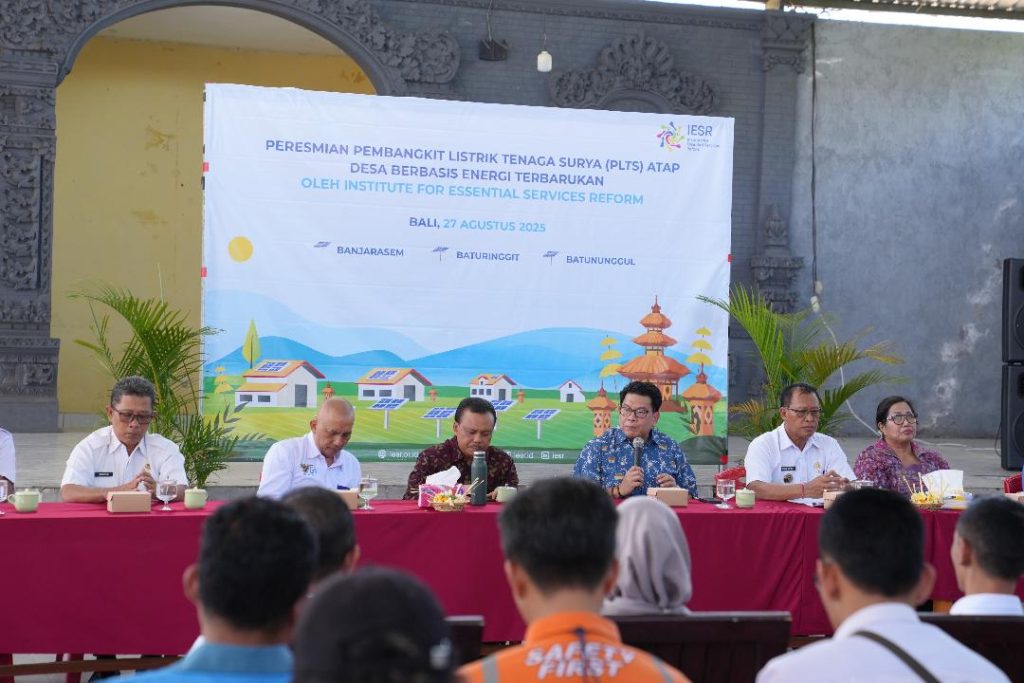
Jakarta – Three villages in Bali now have additional access to environmentally friendly electricity after four solar power plants (PLTS) with a total capacity of 15.37 kWp officially began operating. The inauguration was carried out by the Institute for Essential Services Reform (IESR) together with the Provincial Government of Bali in Banjarasem Village, Buleleng Regency, on Wednesday, August 27.
IESR Chief Executive Officer (CEO) Fabby Tumiwa stated that the project was designed to ensure that rural communities directly benefit from renewable energy. “Solar energy must be present in the lives of rural communities, not only to meet electricity needs, but also to support the people’s economy and public services. This is the true face of an inclusive energy transition,” said Fabby.
Four solar power installations are located across three districts, each serving a distinct function. In Banjarasem Village, Buleleng: a 3.48 kWp solar power plant and a 4.8 kWh battery are installed at the village office.
In Baturinggit Village, Karangasem, a 3.48 kWp solar power plant and a 4.8 kWh battery were installed for the village water pump. In Batununggul Village, Nusa Penida, Klungkung, a 5.95 kWp solar power plant and a 4.8 kWh battery have been installed at the Nusa Penida Sub-District Office, and a 2.46 kWp solar power plant with a 5.12 kWh battery has been installed at SD Negeri 1 Batununggul.
The solar power systems in Banjarasem, Baturinggit, and Batununggul Elementary School have been operational since July 2025. The installation at the Nusa Penida Subdistrict Office is expected to be fully operational in September 2025.
Tangible benefits for residents
The solar power plant in Baturinggit Village supports the operation of Pamsimas water pumps that serve 150 households. BUMDes manages it with trained local technicians. In Banjarasem, electricity from the solar power plant supports village hall activities and public services. In Batununggul, solar power plants in the sub-district office and schools support Nusa Penida’s target of 100 per cent renewable energy by 2030.
“This solar power plant can reduce the village’s electricity bill by up to 60 per cent. The budget that is usually used to pay for electricity can be diverted to other productive programs,” explained Fabby.
Bali has approximately 22 gigawatts (GW) of solar energy potential, but less than one per cent of this is currently being utilised. IESR believes that village-based renewable energy initiatives are the first step toward energy independence for Bali and strengthening the local economy.
The Regional Secretary of Bali Province, Dewa Made Indra, who attended the inauguration on behalf of the Governor of Bali, said the importance of expanding the replication of similar projects.
“A simple understanding of the benefits of solar power must be conveyed to the community. If they can feel the efficiency and benefits, interest in renewable energy will automatically grow,” said Dewa Made.
Funding for this solar power plant project is supported by the philanthropic organisation ViriyaENB, which has been participating in the Bali Net Zero Emission (NZE) 2045 initiative since 2023.
IESR hopes that this pilot project model can be replicated by other villages in Bali, with support from the district/city and central governments, as well as public and private funding. (Hartatik)
Banner photo: Image generated by OpenAI’s DALL·E via ChatGPT (2025)















